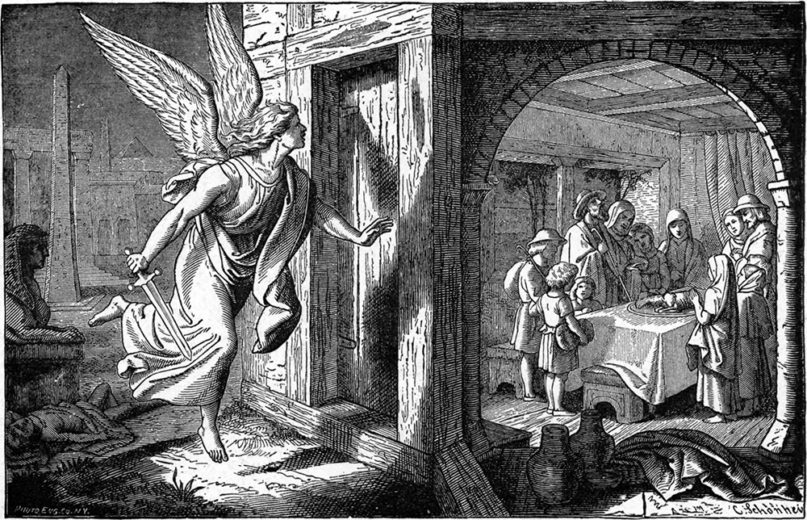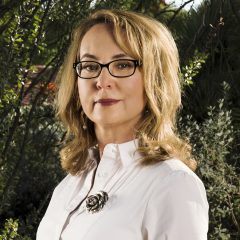(RNS) — By now, many people know my story. How I was elected to Congress, representing Southern Arizona, at a young age. How I married an astronaut. How I was shot in the head while meeting with my constituents outside a grocery store one sunny morning, and how I survived. How I’ve had to learn again how to do so much — walk, and talk and be an advocate for things I believe in.
I’ve kept my spiritual life more private. But now, as spring flowers begin to bloom and we look ahead after a year of enduring so much, I want to share some of what makes Passover, the Jewish holiday of renewal and freedom, so special to me.
The comfort of Passover — the promise of arriving at a safer place — is much needed, too, after seven days of violence and loss in Atlanta and in Boulder and the long months of the pandemic, with economic crises and isolation leading to an increase in domestic violence, and a worsening of the already relentless toll of gun violence on communities of color.
RELATED: Boulder’s faith community comes together to grieve after grocery store shooting
I wasn’t raised Jewish. My mom is a Christian Scientist, but my dad’s family is Jewish, and I always felt a pull toward Jewish traditions. When I got to visit Israel, standing in awe in front of the Wailing Wall and on the banks of the Dead Sea, my connection deepened.
In Tucson, where I live, I’ve been fortunate to find Rabbi Stephanie Aaron, who discovered Judaism and chose it for herself. She has been my loving guide since I met her at her congregation, Chaverim. In Judaism I’ve found a deep reservoir of values that inform my life — of tzedakah, the ethical commitment to help the poor and suffering, and Tikkun Olam, repairing the world.
Passover is an eight-day holiday commemorating the experience of the Jews in Egypt, their exodus from Egypt and their journey to freedom. During the Seder, the festival meal and ritual of storytelling, we tell the story of the calamities that befell the Jews in Egypt. We tell the story of their long journey to freedom, fraught with peril. We make explicit connections to our lives now.
And what a story it is! It’s a story of meeting desperation with ingenuity — leaving so quickly the bread could not rise, leaving us to eat the crunchy, unleavened matzoh. It’s a generational story of saving the first born, which we tell every year, making sure to include the voices of children in our narrative.
For many years, I have celebrated Passover at the home of my dear friends Heather and David Albert, founding members of congregation Chaverim. Heather, a radiant person and a creator of community who brings joy wherever she goes, hosts her Seder dinner at a barn on her property in Arizona. Walking out through the desert landscape in back of Heather’s house toward the barn — decorated, bright with festive lights, filled with welcoming voices — is itself a part of my Passover ritual. There is much laughter. We find laughter throughout this story of endurance and redemption, which I love.
But every family has its own Passover traditions. At my friend Hayley’s seder, her mom’s charoset — the sweet mixture of nuts and spices and other ingredients that we eat to signify the mortar used by Jewish slaves building pyramids in Egypt — is taken from someplace new in the world every year, spurring talk about its origins and significance. My friend Jen’s grandmother Hannah told her grandkids that beautiful spring birds came out of the matzoh balls in the Seder soup when you cut them open — a story the family continues to pass on to the younger members.
It’s surely no coincidence that Passover, like many spring spiritual rituals, marks the time of spring — of renewal, rebirth, endurance. As a child, I celebrated Easter with my mom. We dyed eggs bright colors together. Holi, the Hindu festival of colors, is in the spring, as is Nowruz, the Persian New Year symbolizing rebirth and the link between humans and nature.
This year, more than any, we are all longing for each other, and for renewal. We all want to feel free to explore, rather than stay indoors. We want to feel free from fear, as the vaccine rollout continues and the virus recedes. We want to return to familiar traditions together, from our spiritual festival to our coffee klatches and book groups. I want to hug people! I thrive off of connection with others, and hugging is such a powerful way I experience connection.
And while we are still unsteady on our feet — retuning to places we haven’t been, hoping to find a job to replace one that’s lost, coming to terms with the absence of a loved one — spring performs her rituals for us just as always. In my beloved Arizona, the poppies start to bloom, their riotous sunny yellow blossoms awash across front yards and parks. Our state tree, the Palo Verde, gets golden leaves on its green boughs. When I’m out on my bike rides, I see hawks, other birds wheeling in the sky. The days get longer.
This week, my heart was heavy. I grieved for the eight people murdered senselessly in Atlanta, and then again for the 10 people who lost their lives in a hail of bullets in a grocery store in Boulder, eerily reminiscent of the shooting that took so many lives in my community and changed me forever, and for so many lives lost.
Sometimes, my fight for a safer country feels hard, and heavy. I know this year at Seder I’ll be listening for the familiar comforting words describing how the Israelites kept going, through the desert and the Red Sea, until they were finally safe.
ARCHIVE: Which religions support gun control in the US?
After tragedy or trauma, we don’t go back to who we once were. But as I know in my deepest heart, we grow stronger and tougher through what we endure, even as it changes us. The rituals we observe, the ancient stories we tell, help us move forward. In the ancient words of my Jewish forefathers and foremothers, we are “brought forth from bondage unto freedom, from sorrow unto joy, from mourning unto festivity, from darkness unto great light, and from servitude unto redemption.”
(Gabrielle Giffords was a Democratic U.S. Representative from Arizona from 2007-2012. She is the founder of Giffords, an organization dedicated to saving lives from gun violence. The view expressed in this commentary do not necessarily reflect those of Religion News Service.)






